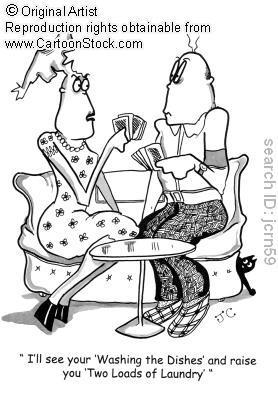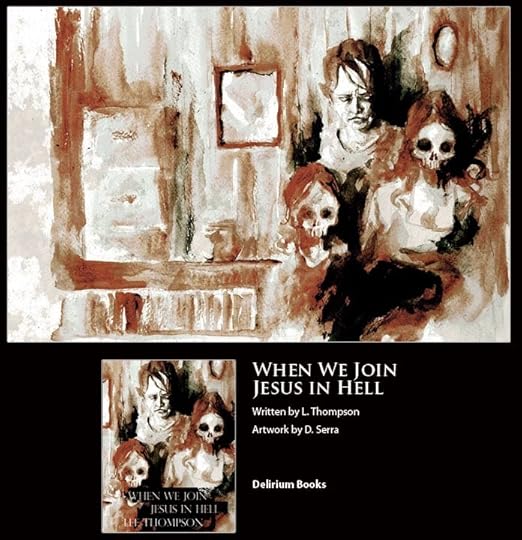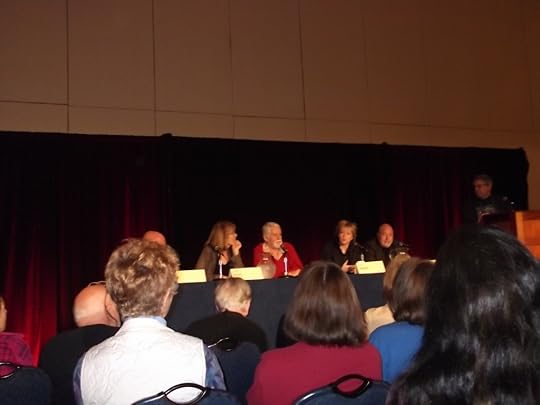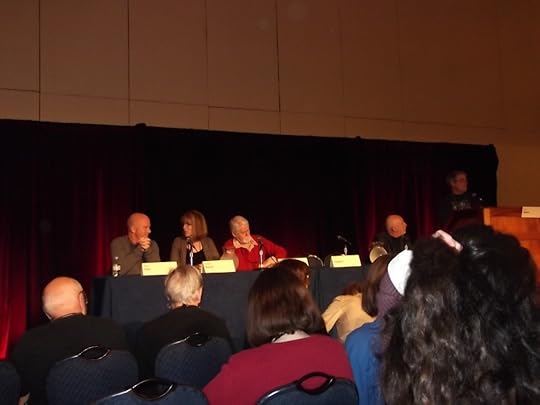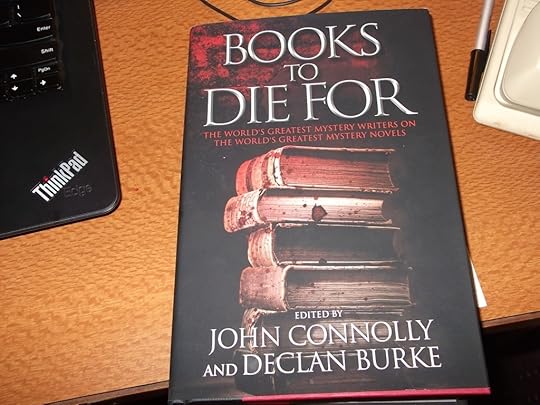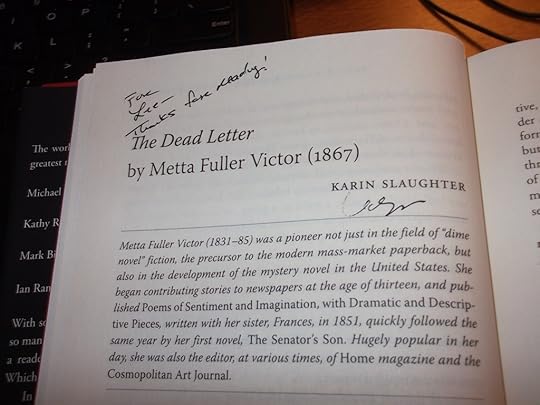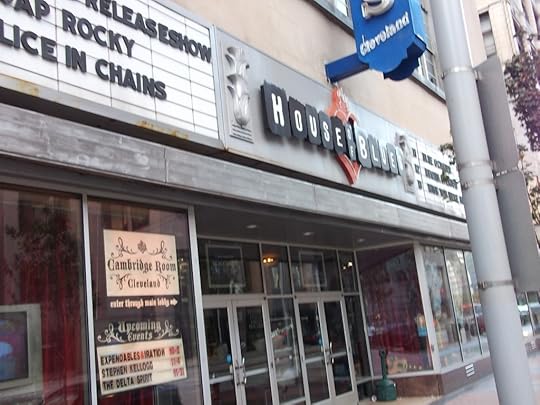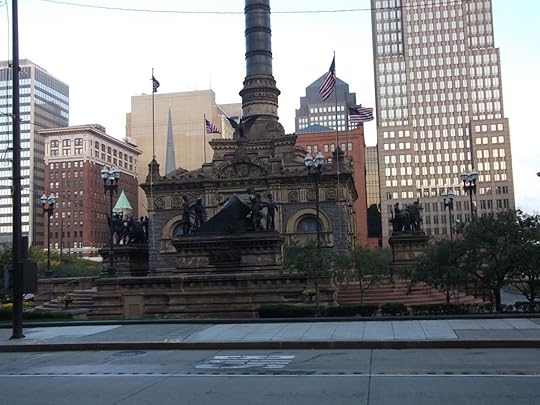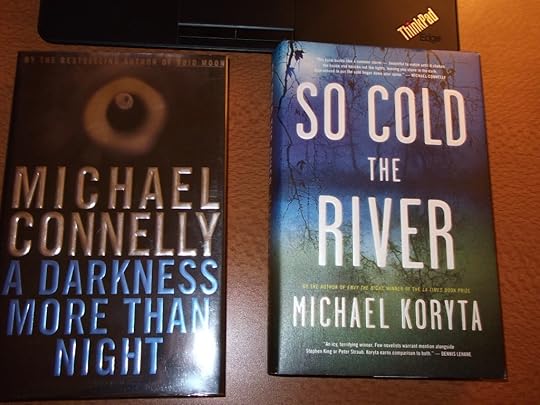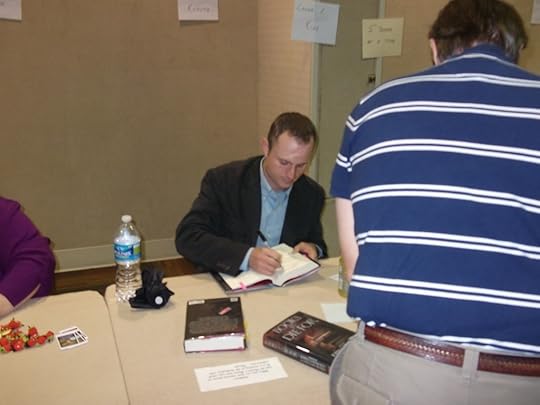Lee Thompson's Blog, page 13
November 27, 2012
Tuesday’s Training: Raising the Stakes
Beginning writers are told to avoid creating one-dimensional characters, but I believe it’s just as detrimental (and possibly more common for a beginner) to construct a one-dimensional plot.
Raising the stakes is such an important part of the craft. When it’s not mastered you end up with a novel that reads at the same emotional depth the whole way through and the challenges never get tougher and the protagonist isn’t tested enough.
Novels like that have a ‘flat’ feel to them. It’s like giving someone a flat soda to drink. Bah. Don’t do that.
The good news is that once you learn to raise the stakes it’ll make your plot more gripping and the changes the characters undergo will be more powerful.
So, let’s begin, yeah?
I’m not sure if you do any prep work or not when it comes to plot. Totally up to you. But here are some things to think about/consider at least while composing–though I strongly encourage considering these things ‘before’ and ‘during’ the composition of your magnum opus…
There are more than physical stakes.
There is social ridicule, embarrassment, familial complications, isolation (whether forced upon the protag, or of his own choosing out of stubbornness, or wanting to protect those close to him), professional/work trouble (such as backstabbing, small-scale espionage, double crosses, loss of said financial security… which makes me think this all boils down to a loss of security. Remember that: Loss of security and the character working to regain it), and there is the emotional damage that arises from all of the above. The emotional damage of failing to be who they want to be, or who others think they should be. Brainstorm. Figure out what will hurt them most and why it will hurt them (because everybody handles things differently.) You want to make things worse on your character, to make the reader (and hero) wonder what will happen next. You really have to test their wit, ingenuity, and understanding of themselves and the world they live in.
The simplest way to see where stakes are raised is by looking at the Doorways in your story. The story opens up once a character crosses–or is forced to cross–a threshold.
Doorways are easily identifiable in most stories. My best learning experience came from making note of where they fell in old Twilight Zone episodes. Doorways are points when things become irreversible, and they also drive the characters toward the climax. At first the protagonist’s ordinary world is upset directly and it won’t return to normal until they do something about it. Then come complications (some brought on by their choices, some brought by outside influences). It’s not my job to show that to you. Go grab some of your favorite books and see where the protag’s world has gone from normal to not-normal. That’s the first doorway. How does your favorite writer achieve/present the dilemma? Go look at five more of your favorite novels. Take notes. See where things take a turn for the worse, how the character reacts, how things grow worse still. Highlight them.
If you need a craft-style book to understand it, I suggest Plot & Structure by James Scott Bell. I’ve read it countless times (okay, four times) and believe it lays things out plainly enough with examples for anybody to grasp.
Raising the stakes also requires understanding what your character wants. If you don’t know what they want, and can’t present it clearly and succinctly, you’ll want to figure it out. Not only will it help you write your novel, it will be essential in writing a query letter and synopsis.
What your character wants is the driving force alongside what prevents them from getting what they want.
For me, the best way to see if my protagonist’s stakes are raised is to do a chapter-by-chapter outline. I summarize each chapter in a paragraph. Is the character spinning their wheels chapter after chapter? Do they make decisions and do those decisions complicate how to get what they want?
Like most other skills, it takes being aware of how the professionals do it, and learning how to apply it to your own work. So read a lot. Read more now than you’ve ever read before. Soak it up. Be a sponge. Ask why? a lot. Then search for the answers.
Next week we’ll look at Showing vs. Telling. For more thoughts on writing craft go here.
November 19, 2012
Tuesday’s Training: Approaching the Second Draft of Your Novel
You’ve worked months or years on the first draft of your novel. You’re excited and burned out from living in your imagination more intensely than you’ve been living your normal life. But you do this because you want to make your imaginary life an intricate part of your everyday gig, to entertain readers, to do more than follow your dream. There are no hard and fast rules for success or self-expression. All you can do is write the best novel you can manage during that point of your life, revise it, sell it, revise it some more, and let people know it’s there while you’re hard at work on repeating the process.
Depending on the writer and their experience, the first draft of a new novel can be a horrible mess studded with some gems, or a nearly ready manuscript that just takes some tweaking. I’ll share what works for me on a second draft, just some questions and how I approach tackling the rewrite/revisions. You may not agree with all of it, but try some of the suggestions to see if they help or not.
I like to run while the book is burning hot. As soon as the first draft is finished I’m starting at the beginning and making notes in the manuscript using a “#” to mark where I may need to consider making changes.
For me, addressing the big issues first, is paramount. Then I can take care of the small stuff like spell checking, repetitive words, etc.
Big Issues
#1. Does the end tie into the beginning?
#2. How can I work the setting against the characters more?
#3. Is every paragraph clear?
#4. Is the climax big enough and have an emotional payoff?
#5. Is there anything that can be held back until further in the novel?
#6. Is the novel’s tone consistent?
#7. Why will the reader empathize with these characters?
#8. Is the antagonist demonstrating any redeeming qualities?
#9. Is every scene necessary? If one is removed will it destroy the plot?
#10. Are the biggest moments big enough? Are the small moments quiet enough?
#11. Does every scene propel the protagonists deeper into the story?
#12. Are the stakes raised higher the further the reader gets into the novel?
#13. Do actions and reactions happen logically?
#14. Does every scene end with a reason for the reader to start the next chapter?
#15. What “out-of-character’ things happen because a character is terrified, relieved, or desperate?
#16. What places am I being vague and lazy instead of being specific and creative?
Once I address those big questions and tweak the manuscript, I can tackle the little stuff.
Little Issues
#1. Are there any word choices that seem forced?
#2. Is the description clear and lively from the POV of the character’?
#3. Use the search function to find words seen too many times in this genre: For example: “Dark,” “Look (ed, ing),” “Dread,” “Black,” “Forced,” “Angry,” “Gun,” etc.
#4. Are the similes and metaphors clear and original?
#5. Proofread for typos.
I keep the big questions in mind as I’m writing the first draft, so when it’s finished and I come back to give them my full attention, I have less work to do.
What has worked in tightening second drafts for you?
For more writing tips, go here.
I save the proofread for typos until I’ve done everything else.
November 16, 2012
What I’m reading and other stuff
Beautiful weather here which always lightens my mood. Working hard on my Crime novel THE WOLVERINE and think I can reach my goal of finishing the first draft by the end of the month then I can whisk it off to my readers Shaun, Kevin, Chris and Charlene. Very excited to hear their feedback!
Lately I’ve read, or am reading:
The second Detective Kubu novel THE SECOND DEATH OF GOODLUCK TINUBU by Michael Stanley (the writing team of Michael Sears and Stanley Trollip, whom I met at Bouchercon last month.) Love the series and can’t wait to finish this one and get my hands on the third novel which recently won the Barry Award for Best Paperback Original. Michael and Stanley are also working on some interview questions about writing as a team and the aspects of the Detective Kubu series. Very wonderful guys and I highly recommend giving the series a chance!
Also reading BEAUTIFUL SORROWS by Mercedes Yardley. It’s beautiful and heartbreaking. Along with Cate Gardner and A.C. Wise, she’s easily one of my favorite speculative writers. Beautiful Sorrows is like a soft kiss on the lips and a sledgehammer to the heart. You can grab a copy from Shock Totem! You can also read this interview with M about Beautiful Sorrows where she mentions me because we’re both so damn awesome.
I also read the second Jack Reacher novel DIE TRYING by Lee Child. Met him at Bouchercon last month, too. These are such fun and fast reads. Really looking forward to #3.
I gave my first blurb to Les Edgerton (another writer and very interesting man I met at Bouchercon) for his wicked novella THE RAPIST. He’s tackled some very hard subject matter with a deft hand, filled it with textures and colors a lesser writer can only dream of. It’s not an easy read, but it’s well worth the time. Can’t wait until it comes out to see how people react to it.
I had a great review from Steven Pattee at Horror Talk for WHEN WE JOIN JESUS IN HELL. He called it “Poetry for those who hate poetry…” and said, “Be prepared for an asskicking from this novella.” Really happy with all the feedback this story has received since it’s probably my favorite novella I’ve written so far.
And it shouldn’t be too long before the second Red Piccirilli book WITHIN THIS GARDEN WEEPING is released digitally by Darkfuse. It takes what happened in Before Leonora Wakes a big step further into the dark heart of the matter that is Division. Artwork by Dani Serra.
What has caught your interest lately? Read anything that has floored you?
November 12, 2012
Tuesday’s Training: Finding Your Voice
“As a writer, you should not judge, you should understand.”
― Ernest Hemingway
A lot of beginning writers worry about finding their voice. They spend money on courses and exert an incredible amount of energy thinking about it. I think it is within us from the beginning. It’s not hiding at all. Our voice is our experience, our biases, our pains, our joys, our passions, the themes of our own lives. We just need to learn and practice our craft so the expression and execution of those things that are ours and of us come across as powerfully as possible.
I believe, at least in my own case, that there is a duality that has to be acknowledged and embraced. My duality is a deep-seated wonder of life and people in contrast to the other side of my nature which is hip-deep in melancholy. I can write with authority in a certain area because I know them, feel them, and they’re of my essence.
I believe favorite writers–like Dennis Lehane, Stephen King, John Connolly, William Faulkner, Hemingway, Michael Connelly–all have a unique voice. Their writing is an extension of them is my bet.
You want to discover your voice? Know thyself. Your voice comes from honesty, reflection, acknowledgment, craft and confidence.
What holds people back from letting their voice out? Fear is probably number one. We don’t want people to hear what resonates in our hearts, what makes us us, and not accept it, or worse, make fun of it/judge it, and in turn judge us. But that’s part of connecting, and we can’t please everybody, so write from your deepest self. I get it, our egos our fragile. Yet I believe that if we’re spending a ton of energy protecting who we really are then we’re NOT expressing who we really are.
Know thyself.
It’s also fun to explore the things we squirm away from. The ‘hot buttons’ for us. I think it’s a quick way to challenge ourselves, by creating a character who shares an opposing core belief different from one of our own, and instead of showing the reader how the character is wrong, let the character show why he’s right from his perspective. It’s an important skill learned to grow as a person and a writer. To gain new perspective and tear down the walls we build to protect ourselves from the world.
What do you really want to write, more than anything else in the world? What story are you scared to tell because you’re afraid of what those around you might think of you?
What do you think you need to become a great writer that you lack now? Once you can identify it, you can learn it. You can learn what is important to say and what is wasted breath. You learn what you fear is not insurmountable, even if every fiber of your being cries out that you can’t do it, or think it, or say it. You learn to understand yourself, the good and the horrible. And you learn to understand other people and show their lives honestly, beauty and blemish.
Everything you need voice-wise is already intact. You just have to trust yourself. Refine it. Learn how to express yourself masterly. Expect that not only will you discover the voice already inside you, but it will morph as you experience more, assimilate it, reflect upon it, and share it.
For more writing advice visit this page. If you find any of it helpful, share it with someone else.
p
November 8, 2012
Opening of my Crime WIP “The Wolverine”
Rocking on this Crime novel THE WOLVERINE that I intend to sell under the pen name James Logan. It’s a dark and complexly layered Thriller. Here’s a simple teaser:
A Texas Senator’s teenager is brutally murdered on shamed ex-Governor Edward Wood’s lawn. The Senator and his wife are missing. Eddie Wood claims he saw a man with scars on the backs of his hands beyond the kid as he stumbled onto his property and died from his wounds.
Eddie’s drug dealing son, Sammy, suspects his father of the crime since his old man has snapped once before on a seemingly normal sunny day, when he beat his wife with a lead pipe and crippled her before coming back to his senses.
Sammy searches for the truth in direct opposition of a Corpus Christi detective, risking exposure of his budding criminal empire, and totally unprepared for what he’s about to find.
One
He said he noticed the tall guy in the black rain slicker and wide-brimmed hat first.
Then he noticed the teenage boy between them covered in blood.
My old man swore this is what he noticed first, but I had a hard time believing him because he’d had history tormenting this kid, and there was the day he’d snapped and beat my mother into a coma, not to mention my father had made a career based on lying.
The day the boy and the stranger made their grand appearance it’d been raining all morning, the quiet street close to the bay lost beneath the drumming of nearby thunder, the quick etch of lightning across car windshields, these cars more upscale than most, parked in front of the fancy houses lining the cul-de-sac. It was a peaceful street in a town on the southeast Texas coastline, not far from Corpus Christi. My father had watched men and women go about their business, fretting over things that didn’t amount to more than strands of plastic, polished steel, fake tits and even faker smiles. Once he’d been one of them, the great Edward Woods, but after a nervous breakdown, he beat our mother with a lead pipe, cracked her skull. She was in the coma for a week and the neurosurgeon said her chances of ever walking again were slim. After that I was done with him, and our mom left us all, as if even seeing the children she bore with her husband and attacker was too much to handle. Our father gave his resignation as governor before they could fire him.
After his resignation he seemed quiet and peaceful again for the most part, but every once in a while, for what appeared no reason at all, he’d tormented some of the neighboring children by making his big Shepherd, Grendel, chase them down the road.
What a bad joke.
But he’d learned that someone seriously bleeding wasn’t a joke. Whether it was strangers in a bar fight, some brothers dishing each other pain, or friends cutting each other over some girl who wouldn’t be there for either of them in a year, blood wasn’t stingy.
Blood came like rain, sometimes a trickle, other times a cascade.
He didn’t know why the kid was bleeding, though it was easy to give into speculation, the way the world fed on its own dark center, lost in some numbing agent or another to tide them over until things got better, and deals made in those trades along the coast—drugs, booze, prostitution, gambling, arms dealing—sometimes went wrong.
The teenager stumbled forward into his yard, looking at nothing, his face slack. He was seventeen, the same age as my little sister Delilah. My father sat there on the porch with Grendel.
The kid, Shaun Garrett, had one hand raised toward my father, a gash in his forehead leaking fluid in his eyes. He said, loudly, “Anna?”
The man in the slicker paused at the end of the block, his face a pale mask beneath the hat, the only thing remarkable about him sticking out sharply in contrast to the gloom. My father remembered thinking he thought the stranger had thick white scars running from his knuckles up to where his jacket covered his wrists.
For some reason those scars frightened him, reminded him of something painful from childhood that he’d thought he’d hidden away for good.
The boy slowly assessed where he was, the condition he was in, and that there was help waiting for him on the porch. He tried to take a step forward, tripped over his own feet, and landed heavily in wet grass, a geyser of water splashing in front of his face like a load of buckshot.
He tried to rise, a few dozen holes in his pants and tee-shirt showing all the red ravaged flesh beneath. He slipped again on his hands and knees. He shook his head, trying to get his bearings. Some people think that’s the beauty of violence; that it leaves you so shaken, so essentially you, that the act committed strips you of your masks and leaves you stark naked, and defenseless, and wholly you.
The stranger, as much as he hated seeing his quarry escape for a moment, didn’t make a move. He just watched with the rain dripping from the brim of that hat. My father couldn’t see his face clearly. He didn’t want to. For years, other than the children who had learned to avoid him, Eddie Woods had done his best to avoid eye contact with anybody.
His hand was a foot from his cell phone. It lay on the small table where his tall boy of Labatts rested. He stared at it dumbly for a second before casting his gaze back across the lawn.
The kid sobbed and rolled onto his back, let the rain pummel him.
The three of them held their positions a moment longer.
My father thought he heard the roar of the tide close by, even though he lived a mile from shore, as the stranger turned his back to them and wandered up the street from the direction he and Shaun Garrett had come. The drizzle swallowed his form. My father blinked. He looked at the boy in the grass. His fingers brushed the phone and he was dialing before he realized what he was doing. Grendel tramped into the soggy turf and approached the boy.
My dad’s chest hurt, he thought he may have a heartattack. He spoke numbly into his cell once the 911 operator answered. He gave her the necessary information and explained what he’d seen. Wiping his eyes, he sighed deeply, and said, “Yes,” though he had no idea what he was saying it in response to.
In his yard, Grendel whined and nudged the motionless Senator’s son with his muzzle.
Two
The detective’s name was Jim Thompson. He looked like a fire hydrant with a thick trunk, a low center of gravity, short arms and a shot of bright red hair. He didn’t like me and I tolerated him, but he had a lot of respect for my father and seemed friendly with my brother Andy who worked for the local paper. Jim questioned my father while the forensic team worked over the boy’s corpse, it firmly planted in his mind that the great Edward Woods had fallen far and fallen fast, yet still retained something that most people just didn’t have.
Too bad he was the only one who could see it.
My father sipped his beer, a deep chill running through him after Jim said, “You know whose son that was, correct, sir?”
My father nodded, once, slowly. He said, “Marcus Garrett’s son.”
Mr. Garrett was Texas’s senator, a big jolly man who claimed it his God-given calling to clean our state’s streets of all the things that stained them. He’d grown up poor on the streets of Dallas and worked hard to get ahead and establish a legacy his children and grandchildren could be proud of and adhere to. Under the first year of his term, things began to change on the street, which was an unexpected occurrence and one I wasn’t particularly fond of since it cut into my business. But it proved beneficial because most of the criminals in prison are the dumb ones, or those who act on a whim, or those with no long term plan. I wasn’t brilliant but I wasn’t retarded either. I had things firmly established, a great product that not just any jackass could get their hands on, and if a situation arose that required drastic actions I’d sleep on it—sometimes for a couple nights so I could move with a clear head and an iron-clad alibi.
At first I, like my father and brother, thought all of Senator Garrett’s hyperbole was a political move, just another blowhard with no backbone. But old Mr. Garrett was just as fervent in action as he was in his speeches to the communities he visited. He was a man who caused ripples. Some people don’t like ripples, which is probably why Detective Thompson said, “We can’t find them, sir.”
“What?” my father said. “Who?”
“Mr. Garrett and his wife.” He leaned forward, said, “Do you have any idea of their whereabouts?”
My father, Eddie, stared at the Jim’s shoes. They were black with thick rubber soles that gave him an inch or two of extra height. “No, I haven’t got a clue.”
The rain let up and the air grew humid. A stray spray of rain stabbed a puddle in the road. The detective sat on the top porch step. He said, “Why did their son run into your yard, sir?”
“I have no idea what the kid was thinking,” my father said.
“And your daughter,” Jim said, looking at his notepad. “Delilah? She knew him well, didn’t she?”
Eddie swallowed hard. He took a long slug and set the empty can down. He went inside the house to retrieve a new can. Detective Thompson turned and sighed, placing his back to the porch support and leaned hard into it. He’d had some suspicions but knew he had to keep them in check and let the evidence lead him toward what happened here. To most people he’d tell them that he hated cases like this, ones involving murder, but secretly they were his favorites. Cases like this were the only time he slept well at night. It fed his belief that his job was making a difference. He believed that if there was any justice in the world it was that everybody’s humanity was laid bare beneath the harsh light of tragedy. He and the stranger had that belief in common. And I had to agree with them. You didn’t know somebody well when all you saw was their happy-go-lucky side. You had to see them broken and so broken they were unashamed and unguarded. That’s who they really were.
Jim smiled a little, feeling guilty for it. He wasn’t sure if Eddie was coming back out, which didn’t bother him too much, he’d gotten most of the information he needed, though he thought the old man was holding some things back. Then again, everybody held some information back. He ascribed the need to keep secrets as a basic human function. Hell, he still did it with his wife, sometimes to protect her, sometimes just because he didn’t think it was any of her business. And he was certain she did it to him, just like they both did with their parents, telling them they were as happy as they’d ever been and never broaching the defeat they felt since finding out they couldn’t have children.
Children and parents, he thought. What a strange dynamic.
He wondered where the senator and his wife had gotten off to, it still too early for him to expect anything suspicious regarding their whereabouts since the patrolmen he’d sent to their house down the street reported it undisturbed.
He scratched his head, wondering where the kid had come from then, rolling with a theory that he’d been abducted for ransom, escaped, and suffered the consequences of escaping. Sometimes all it took to fuck you up was bad timing, or not enough endurance.
He glanced at the team working over the body, catching glimpses of the corpse they knelt before. The kid was chewed up. Looked like somebody had used a meat grinder on his legs, arms and torso. It tainted the puddle of water he lay in pink. Upon first arriving and seeing Grendel with his bloody snout, Jim had feared the dog finally went and did it after the last few years of Eddie encouraging him to attack the kids who lived down this way—which he never understood in the first place since the old governor was one of them, even if two of his three kids didn’t have respectable jobs—and he thought that maybe Eddie hadn’t been able to stop the mutt once the leash slipped from his hand. But the forensics team concluded that the punctures weren’t caused by a dog, and Grendel had been sitting there next to Shaun Garrett, whining, his teeth clean. It seemed good natured. A kind of dog he’d always wanted. It crossed his mind to take it with him when he left until he realized how stupid that sounded, thinking that a moment later if nothing else it’d at least bring a glimmer of the old Edward Woods back.
Jim rubbed his head then stood. He tried to peer through the screen door and into the darkened interior of the house. He wondered what keepsakes the old man had on the mantel from his glory days as governor. He wondered how my dad slept at all when he had a son—me—who lived a life he didn’t approve of, and he had a daughter who ran the fringe as well. He thought Andy was probably the saving grace and had been the only one to inherit Eddie’s better traits: balance, honesty, fairness.
I wouldn’t have argued with him. I never claimed to be a good guy and I knew my sister was always one step away from lock-up because she couldn’t keep her mouth shut or her hands off what didn’t belong to her. And that was partly my fault and partly my parents.
Three
The day the stranger with the scarred hands turned his back on my father and Shaun Garrett, Delilah was smoking weed in a small apartment overlooking main street, perched on the corner of a mattress in a bedroom full of stolen goods. She was built like a gymnast with dark eyes and pale skin. Pretty much everybody who met her loved her. She drifted off into a netherwhere from time to time when she was alone, like now, as she moved into the living room and reclined on the sofa, knowing that Shaun would be back soon with what she wanted from his dad’s house, and then they could celebrate.
Delilah usually attracted the wrong kind of people, and by people I mean men. She didn’t live in one of those fairy tales where she thought she could take some ex-con and mold him like clay, her deft fingers shaping him into what she thought he could be instead of what he really was. She went for the good boys instead and chose to corrupt them.
She’d known Shaun Garrett since they were children. They’d gone through private school together until Dad had his breakdown and she ran away. Garrett watched her from afar, crushing hard and then harder as the years passed and they’d matured. It’d taken her running away at fourteen for Shaun to go looking for her. At first he’d went to Andy, who our sister never much liked—her always believing him a people pleaser—but our brother didn’t know where she was or he would have told our father, not that he claimed to care since seeing or talking to her reminded him of conversations he’d shared with our mother. After discovering from Andy that I was the closer brother to Delilah, Shaun came looking for me. He found me, but on a bad day, and he got lippy, the kid frustrated that nobody seemed to care about my sister’s welfare or his puppy love. He demanded I tell him where she was hiding, and if he didn’t have a valiant stead and a Knight’s armor, I’d imagined he did. Something about his attitude got to me and I hurt him a little, needing somewhere to direct my anger with my father even though in many ways I was just like him.
I punched Shaun hard enough to make him bleed but soft enough that he could try and fight back.
It went on for twenty minutes.
The whole time his face shifted from my father’s to his father, never either of them for more than a few seconds. My partner, Levi, he said nothing, just watched with sad eyes as if I’d disappointed him. After it was over, after I went and found Delilah and ran her to meet the kid at a café downtown, I told Shaun if he let her hurt him it’d teach him an important lesson. Delilah smiled, sitting across from him, because she saw what I did, this helpless, spoiled brat who didn’t know what he was stepping into by opening up his heart.
He’d kept up appearances with his parents but disappeared nightly to join Delilah in some scheme or another, both of them thinking the beliefs of the young—that they’re eternal, indestructible, and wise.
Shaun hadn’t been eternal, indestructible or wise enough to avoid overdosing once. Delilah had left him in a stinky basement to die if the other people there couldn’t get him help. Luckily for him one of the girls still had enough wits about her to dial 911 and scram. But he went back for Delilah after his father disowned him and his mother sent him to rehab. A few months later he took the fall when Delilah fumbled a burglary. And he came back after a ninety-day stint inside the Wargrove Correctional Facility, a little more cautious around everybody except my sister.
Our father heard about it all through Andy. The two of them were concerned that she was headed for a hard road, unable to accept that she’d been on it for the last couple years, and it was a road that she chose to travel willingly, much like I chose to do what I did despite having other dreams, and they did what they did because it was what came natural, or caused the least amount of discord in their lives.
Don’t rock the boat… Eddie Woods had lived by that until he couldn’t anymore and just gave up because giving up was easier than caring or being responsible for your choices. It’s hard to respect your father when he goes from an employed shit bag to an unemployed one. I’ve never trusted people who spout common catchphrases as if they hold some incredible philosophical meaning. Life isn’t even that complicated. You live and you die. So does everybody you love, and thankfully, everybody you hate.
I can’t say that I hated my sister, but I can’t say that I loved her either. She was talented in what she liked to do, but selfish. I didn’t trust her, even though, in a way, I watched for a glimmer of some kind of goodness she kept suppressed to protect herself.
Even back when Dad was governor, and we’d spent a bunch of time dressed up at a party with his constituencies, I’d find myself bored out of my skull, while Andy smiled and made conversation with those boring, rich assholes, and Delilah teased many of them, saying, “It’s funny how unaware people are that sociopaths are some of the most charming people in the world.”
And those people would laugh and nod, imagining that somehow they could win her affection or acceptance. She had a throaty voice for her size, and when she wasn’t staring directly at you, she was playing at the innocent little girl who needed a knight. So many suckers fall for that. Among them lot of old men in powerful places who enjoy the flesh of an underage girl, especially the daughter of a man they pretended to like but secretly despised, or envied, or simply yielded to.
And Delilah loved every second of seeing their hidden faces, all the desires they kept in check against close scrutiny in their political circles. But she’d always find one, like Shaun Garrett’s father, who her charms didn’t work on, which only made her want to disprove their honor even more. In a way I used to enjoy watching her trap them, but it grew tiresome, just more logs she was tossing on an already out of control fire.
She shifted on the couch that morning, the television’s volume low enough that she could hear car tires squealing and someone yelling down the street. When the news showed our father’s house surrounded by cruisers, their lights flashing, a strange feeling ran through her, soft and quiet at first, but quickly growing in volume and intensity.
She reached for the phone blindly and pressed it tight to her thin, hard stomach. The television showed our father’s house from a different angle as the cameraman shifted, following the reporter, showing at first a smidgen of Edward Wood’s front porch, the end of a scuffed black shoe, then the camera jerked up and she saw our father sitting with a detective. One was in his prime, clean cut, clean. The other, the old man, was wrinkled, shoddy, hunched. He had dark circles beneath his eyes and a can of beer resting in his lap.
Delilah squeezed the phone, felt a tear slip down her cheek, and lowered her head before letting out a long breath. When she looked up again the camera was on the lawn and a group of men discussing something at their feet. One of them shook his head, scratched some notes, while another looked directly at the camera and asked a policeman at the crime-scene tape to get the reporter out of there. The patrolman shrugged then told the reporter to back up.
Delilah waited for the camera to swing back to our father. She waited a long time, long after the report had ended and moved on to other things, before she gathered her senses. She called Andy, plowing through the noise she heard in the background at his office, overriding him as he said, “It’s not a good time, Dee, I—”
“Something happened at Dad’s,” she said.
Hearing grief in her voice, a quality he had come to suspect she lacked, he said, “I don’t have anything on it here. Hold on.”
She was about to tell him that no, she wouldn’t hold on, but decided against as she chewed on a fingernail and stared at the clock hanging between the windows, above the TV. She thought Shaun should have been back an hour ago. A pang of something she’d never call worry bit deep into the pit of her stomach. When Andy came back on the line his voice startled her. He said, “Okay, Dad’s okay, but somebody murdered a kid. You remember Shaun Garrett? The senator’s kid? I don’t have all the details yet but I’ll have them in a bit. I’m going to head over there to talk to him in a few, you’re welcome to ride with me.”
She shook her head. “I can’t.”
“He’d be glad to see you, Dee. He might even need you right now. May be he’s needed you for the lp /spanspan style=”font-size: 12pt; line-height: 200%; font-family: ‘Times New Roman’, ‘serif’; color: #000000;”ast couple of years but you’re both too stubborn to apologize to each other.”
“Let me know what you find out,” she said, not wanting to hear him.
She ended the call and set the phone on the arm of the couch and wrapped her arms around herself. She sat that way for about ten minutes before she slapped herself once, the sting hot across her cheek, nestling up beneath her right eye and burrowing into the smile line at the corner of her lips. She jumped up, went into the bathroom and pulled off the back of the toilet. Knowing it could just be the dope fucking with her head, but thinking it better to be safe than sorry, she withdrew a clear plastic bag, half filled with light blue pills, from the water. After she dried it off with a towel she snagged a garbage bag from the kitchen and slid the first bag into it. She knew it’d be a couple of hours before Andy called back and filled her in on what happened.
She thought, Somehow Sammy found out.
With the package tucked beneath her arm she fled the apartment and disappeared in a throng of the people Dad both pitied and hated, allowing the violent sea of flesh and concrete to swallow her.
If you haven’t read my latest Horror/Noir WHEN WE JOIN JESUS IN HELL, give it a chance. It’s been getting some great feedback, which I’m excited about, and I’m very proud of it. Thanks to those who have already ordered and read it!
November 3, 2012
Random Fun Stuff…
It’s been a crazy and exciting year so far, and it’s hard to believe that it’s almost over.
Right now I’m working on an interview for @HarperCollins author Michael Stanley (Michael Sears and Stanley Trollip) who I met at Bouchercon a month ago where they won the Barry Award for Best Paperback Original for the third novel in their series. They’re such lovely guys and the Detective Kubu series is so unique. I think the interview will be a lot of fun for everybody.
In the past couple days I’ve knocked out some serious story wordage in a new Thriller novel–The Wolverine. I expect I’ll finish the first draft by the end of the month if life doesn’t throw me too many curve balls. It’s about a dysfunctional family and a complex killer, a book that will explore the bonds of family, forgiveness, death, and maturity. This is another novel that I intend to sell under a pen name to keep separate from my Horror/Dark Fantasy work. It’s a lot of fun writing this book like it was to recently write The Lesser People. I see my career branching off, and like the idea of it, since most of my favorite work is more Literary Crime/Thrillers (think Dennis Lehane, John Connolly, Michael Koryta, Michael Connelly, Lee Child.) I’ll still write under my own name too, because I love Dark Fantasy in the vein of Clive Barker, Joe Hill, Brian Hodge, John Gardner, Jack Cady, Neil Gaiman, Robert Dunbar, Greg Gifune, and Peter Straub. So it’ll be a doubly fun adventure to do both genres under different names.
My latest novella (When We Join Jesus in Hell) from Darkfuse is doing well. If you’ve read it, share it with a friend and leave a review somewhere please. I also picked up two new pre-readers yesterday and look forward to their feedback from a reader’s standpoint to balance my writing buddies that pre-read from a writerly/reader angle.
Right now I’m reading William Faulkner’s Snopes Trilogy, and Mercedes M. Yardley’s Beautiful Sorrows. Recently finished John Gardner’s Freddy’s book, which I enjoyed but Grendel (my favorite read so far this year) it is not.
Some things I’ve found interesting around the web lately…
Shock Totem, my favorite Dark Fantasy magazine, shared a bunch of covers here.
Jane Friedman from Writer’s Digest shared this post on her blog: 2 Critical Factors for Successful Stories. It’s a simple way to stay focused and on track in your story.
I love old blues and thought this was a pretty neat movie: Lead Belly.
My hero Tom Piccirilli needs help. You can read about it on Brian Keene’s website.
October 31, 2012
When We Join Jesus in Hell (on sale!)
Go grab you a copy of WHEN WE JOIN JESUS IN HELL (the novella Jack Ketchum called “Hard as Nails”) from Amazon while it’s on sale for $2.99.
Feel free to leave an honest review after reading it.
And if you enjoy it enough, recommend it to somebody who has similar tastes.
Thanks.
October 9, 2012
Tuesday’s Training: Writing a Series Character
While at Bouchercon 2012 in Cleveland last weekend I attended a fun panel about the pleasures and perils of writing a series character. Since series are such a hot commodity, and we as creators are prone to believe our characters are big enough to sustain several books, I figured I’d share a little of what I learned from the panelists (Karin Slaughter, Ben Coes, Michael Sears, Reed Farrill Coleman, and Robin Burcell.) I’m paraphrasing what they said and have possibly misinterpreted some of their comments (if so, my apologies.)
Some of this may be obvious at first glance but how are these things pulled off? That’s what we need to discover.
Some of the writers believe that readers read series because they come to love the character and that the plots are the more forgettable part of the equation. I tend to fall into that camp in belief as well.
Plot serves the story (which is created by the character’s choices.)
Thanks to Karin, Reed, Michael, Robin, and Ben for the great panel at Bouchercon!
Say something new about a character in every book…
When this is done right we come to know the characters better than we know most of our family and friends. This creates an incredible bond between fictional character and reader. Plus it’s just plain fun for the writer to discover things about their story’s hero. Everybody has their secrets, their families secrets, things they’re embarrassed of, uncomfortable around, tastes that have changed, failed relationship partners that haunt them, etc.
Karin also believes that the “Mystery of the Character and What Will This Character do Next?” is a driving force that keeps readers coming back for more…
I agree. A character that will fight for what they want (even if what they want is only for their world to return to normal), and one given certain qualities (like a strong moral compass that can be slightly skewed in certain situations) will surprise us. One of the reasons we read is to be surprised by a character’s actions and what those actions and their consequences teach us. Plus we just like a hero that will stand like we wish we could stand if only we weren’t so busy, or such cowards.
Get under the skin of the crime…
I’m not sure exactly what she meant by this, but I assume (I know, that could be a mistake) that she meant the affects the crime has on the main players involved. Exploring a character’s emotions and how they grapple with something like a serious crime, and the complications they may face in finding justice, open up all kinds of possibilities for the hero’s journey.
You have to put stuff in the book that is only for you…
I like this because I do it in my work too. Things that will mean nothing to nobody else, but they’re a part of me, or part of someone I have loved and who’s gone from my life, fall naturally into certain sections. A song that strikes a certain emotional chord from a pivotal moment in my life. Personal regrets. Even more personal Joys.
Don’t contradict yourself too much because it annoys readers…
Michael Koryta had mentioned this on a panel with Michael Connelly. In one story he had a football field where the end-zones faced north, south, east and west in different sections of the novel. It’s something to ask your first readers to watch for.
Don’t front-load…
If you put everything about the character in the first book you’re left with very little to reveal in subsequent books.
Robin Burcell, being a former police officer, believes that authenticity in location, and on the job, are essential ingredients in forming a solid and believable series…
Get your facts right and learn to show them in a manner that moves the story forward even as it reveals something about your character.
She also believes it helps to have a road map…
If you’ve built the rules of your story world you’ll know when you’re straying outside them.
You have to make it work logically…
It’s incredibly important for your story to unfold logically. If not, you’re insulting your reader’s intelligence and the story will lose steam, become fragmented, and the focus–your character, their motivation, and their plight–become murky.
According to Reed Farrill Coleman, series protags are like “Nuns fret not…”
He spoke of the Wadsworth poem and explained how nuns live a very structured life and how they learn to find satisfaction in that, as well as learning how to find their greatest strengths in the confines of those limitations. And so it goes for your series protagonist… He or she is locked firmly into the books they were in before, and must find ways to get the job done within the limits of those boundaries (history, personality, values, morals, etc.) This also creates a believable character with true inner strength.
Avoid static characters…
There doesn’t have to be growth, it can go the other way. But strong characters do things. They propel the story forward instead of letting things just happen to them.
Keep it fresh for the writing and the reader…
It’s up to you to find ways to keep the characters, and the stories they’re involved in, fresh for you and your readers.
When asked about when to end a series…
Reed said it’s best to allow for a natural progression and to quit when it stops being fresh for you: A good time to quit is when you have nowhere else to take the protagonist and they have nowhere else to take you.
When asked about a protagonist’s family being endangered…
Reed said, If you can make it work, it works. If not, forget it. Don’t force something into the story that doesn’t belong there.
The Whole Point of P.I. Fiction…
Reed said, “The whole point of P.I. fiction is to give the protagonist a tough moral choice.”
I couldn’t agree more.
Michael Sears stated that it is important, both for the writer and the reader, that a character learn over the course of a series to see things in a different light…
In other words, as tough and independent and grounded as our protagonist may be, he or she can’t be narrow-minded forever.
Michael said that solving day-to-day crimes doesn’t keep a series alive…
Take a look at the big picture of your protag’s life, their work, and their place in the world.
On keeping track of events and facts in your series…
Michael and his writing partner, Stanley Trollip, keep a detailed file of pivotal moments and a time line.
On the protagonist’s family being endangered…
Michael said it’s important to learn when to tone it down.
Of his protagonist, he said, “Not exactly a good guy, but he has a good heart…“
I think that most well-known protagonists can be summed up the same. They walk that line between dark and light, but they want the light to win because they know somebody has to do something about it.
On keeping track of events and facts in your series…
Ben said that it’s pretty easy for him since each book is related to the one that came before it and the one that will come after it.
On the subject of the protagonist’s family being endangered…
Ben said that it is unrealistic if nobody important dies. He mentioned the Game of Thrones, and how you come to care so much about these characters and then your heart breaks when one of them is murdered. (I’m a big fan of that type of fiction and think it’s very realistic as well. To me that is real life. None of us are as safe as we’d like to think we are.)
p/p
span style=”color: #000000;”
October 6, 2012
Bouchercon Day 3
Saturday, Day 3:
Got to meet some more heroes in the Crime/Mystery/Thriller genre today! Meeting John Connolly in person was definitely a huge deal to me since he’s one of my biggest influences, and he’s one of the best writers working in the field today. If you haven’t read The Book of Lost Things, get to it. Then give his Charlie Parker series a try! I can’t wait for the next release! Thanks to Clair Lamb again for everything!
John was hilarious, as were those on the Heroes & Villians panel with him (Alafair Burke, Karin Slaughter, Mark Billingham, and Martyn Waites.)
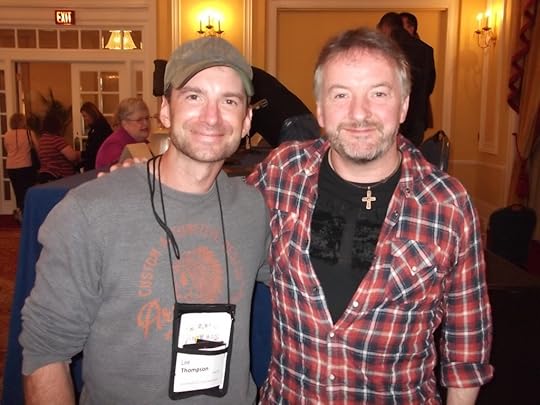
Me and my hero John Connolly
Also met the very interesting Lee Child! He’s a badass. I would have never guessed him to be so soft spoken and reserved, but there you go. What a pleasure. Check out his Jack Reacher series!
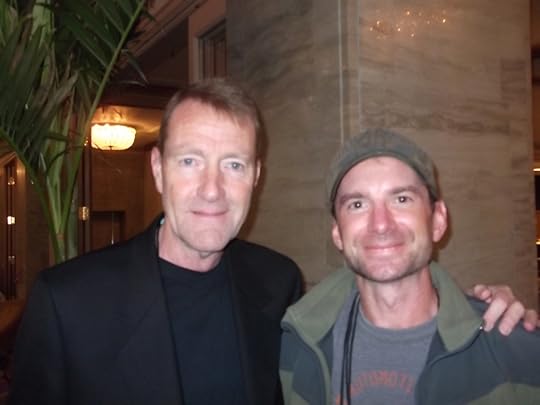
Me and the awesome Lee Child
Meeting Karin Slaughter was a lot of fun. She did a great job in a one-on-one with John Connolly (that sounds so perverted, I know.  ), and she was terrific on the panel called The Pleasures and Perils of Series Slueths with moderator Dave Magayna, and authors Robin Burcell, Reed Farrel Coleman, Michael Sears, and Ben Coes. Great group of authors sharing their wisdom. I took some notes on that experience that I’ll make a post on for the next Tuesday’s Training about writing a series character. Also talked to Michael Sears and Stanley Trollip in the lobby for a while and they were very nice guys. Look forward to interviewing them in the coming month or two about their work and what it’s like to work as a writing team (something I find fascinating.)
), and she was terrific on the panel called The Pleasures and Perils of Series Slueths with moderator Dave Magayna, and authors Robin Burcell, Reed Farrel Coleman, Michael Sears, and Ben Coes. Great group of authors sharing their wisdom. I took some notes on that experience that I’ll make a post on for the next Tuesday’s Training about writing a series character. Also talked to Michael Sears and Stanley Trollip in the lobby for a while and they were very nice guys. Look forward to interviewing them in the coming month or two about their work and what it’s like to work as a writing team (something I find fascinating.)
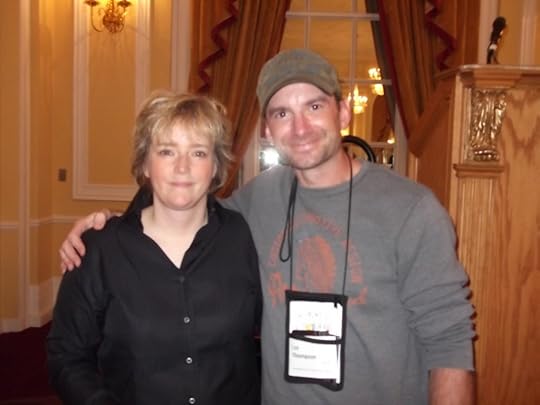
Me and Karin Slaughter
This is one sexy book talking about other sexy books. I have a feeling my TBR pile is going to grow astronomically.
Plus I got some signatures from John Connolly, Lee Child, Karin Slaughter, and Clair Lamb.
Also started reading SO COLD THE RIVER by Michael Koryta and loving it so far. Go check out his work! Thanks to him and Sabrina Callahan for the smiles. That interview between Koryta and Michael Connelly was one of the highlights of the weekend. And it was great talking to Les Edgerton, who is quite the character! Also met Sarah Melnyk from Minatour Books at the bar. She was very cool and made me laugh.
And that’s a wrap. Going to go up there for a bit tomorrow to say goodbye to some people between 9:00 – 10:00 and can’t wait for Bouchercon 2013 in Albany, New York!
Took some random shots of downtown Cleveland, too. Pretty neat city.
Bouchercon Day 2
Day 2 (Friday):
Had a short day Friday because I had a horrible toothache (probably from drinking too much the night before.  ). But I did make it up to the convention for a bit. I listened to a great interview between Michael Connelly (who has been one of my favorite writers for a long, long time) and the very cool Michael Koryta. They’re both wise and entertaining and if you haven’t checked out their work you better rectify that!
). But I did make it up to the convention for a bit. I listened to a great interview between Michael Connelly (who has been one of my favorite writers for a long, long time) and the very cool Michael Koryta. They’re both wise and entertaining and if you haven’t checked out their work you better rectify that!
I video taped some of it but learned that next year I’ll invest in a great camera and sit closer so the quality will be a lot better.
Afterwards I snatched a couple hardcovers from the book room and had them signed.
This lady (Sabrina Callahan, from Little, Brown and Company) kept stepping in the way of photos I took, which I found amusing.  I wanted to buy her and Michael Koryta a drink but due to the tooth ache ended up going back to the motel and sleeping until it went away. For shame! I’ll see if they’re around this morning (it’s 3:19 am on Saturday morning right now) and see if they want to get some pics together and let me grab them both a drink later today. *Fingers crossed*
I wanted to buy her and Michael Koryta a drink but due to the tooth ache ended up going back to the motel and sleeping until it went away. For shame! I’ll see if they’re around this morning (it’s 3:19 am on Saturday morning right now) and see if they want to get some pics together and let me grab them both a drink later today. *Fingers crossed*
Wish I could have stuck around and caught up with Les Edgerton, but I’m sure I’ll see him later today. And I wish I would have been able to stick around for the BOOKS TO DIE for signing, but figure I’ll snag a copy tomorrow and ask Michael Connelly, John Connolly, Lee Child, and some others to sign it when they’re not overwhelmed with attention.
Going to head over there in about five hours to attend the following panels:
9:00-9:50 am- The Pleasures and Perils of Series Sleuths
10:15-11:05 am- Heroes & Villians
11:30-12:20 pm- What a Character
1:30-2:20 pm- Across the Pond
Until then, I’ve got crits to work into my Literary Thriller THE LESSER PEOPLE, and have the galley for my next Darkfuse novella WITHIN THIS GARDEN WEEPING to keep me occupied. Fun! Looking forward to an interesting Saturday!
/p

